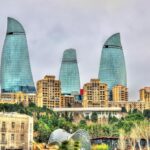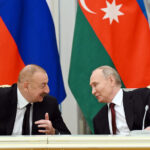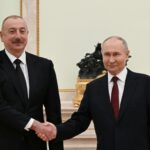After visiting Baku and meeting here with the heads of denominations, the late Supreme Pontiff John Paul II commended the relations between different religions in Azerbaijan. And Pope Francis, having visited Azerbaijan, called our country a true example of tolerance. What do you think is the reason for this tolerant atmosphere?
Tolerance has always been part of the Azerbaijani national identity, and it is rooted in Azerbaijanis’ unique outlook. On the one hand, we have a clear sense of our ethno-cultural identity, and on the other hand, Azerbaijanis are just as intensely aware of their spiritual kinship with all of humanity. Historically, our nation was formed over hundreds of years at the intersection of different religious, ethnic and linguistic cultures, which allowed us to avoid isolationist attitudes, to be open to new things, to love and preserve our traditions, to respect the traditions of others, to draw upon the best of other cultures.
Azerbaijan emerged on the historical and political arena of the world as a multi-ethnic and multi-faith state. The mere fact that the history of the presence of two world religions in Azerbaijan—Islam and Christianity—is almost as long as the history of these religions themselves already speaks volumes. This is an integral part of our national nature. And it is no coincidence that the preservation, multiplication and popularization of historical values of tolerance is part of Azerbaijan’s state policy, initiated by National Leader Heydar Aliyev and successfully implemented by President Ilham Aliyev.
Statements by officials are one thing. But how does this tolerance manifest itself in the society? Do you, as someone who is directly involved with the Catholic Church, have any observations of your own?
There are peculiarities of spiritual culture inherent in the majority of the Azerbaijani people. There is no radicalism in it, no tendency toward spiritual monopoly. Therefore, when it comes to the interaction of Azerbaijanis, most of whom practice Islam, with representatives of other religions, my observations tell me that our people are inclined to look for something these religions have in common, something that can become the basis for cooperation for the benefit of the whole society and the country.
Non-Christian Azerbaijanis come to the Catholic Church in Baku, but the respect and, I would even say, reverence they show for a different faith and its shrines testifies to a high level of religious culture, based on humility before the One Creator. This is very precious.
We can argue a lot about whether or not ethnic, cultural, and religious diversity comes directly from the Will of the Almighty Creator. But one thing is certain: God has allowed this diversity. And everything that God allows is a challenge to humans: how do they use these realities? For good or for bad? I am convinced that through ethnic and religious diversity, God calls humans to a harmonious polyphony, not to conflict, to the creation of peace by accepting the other person as one’s brother, with all their differences. It is in this light that it is so important for us to adhere to the principles of multiculturalism. And in this, Azerbaijan can rightfully serve as an example for the whole world.
How does the Catholic community in the country feel?
In short: very well. Catholics in Azerbaijan are an organic part of the Azerbaijani society. We do not separate ourselves, we do not feel like some kind of ethno-religious ghetto, our Church is multiethnic, and our parishioners represent almost all the peoples living in Azerbaijan, both citizens of the country and foreigners. Our relationship with the society at all levels can be called exemplary. We constantly feel the support of the head of state, Mr. President Ilham Aliyev, and First Vice President Mehriban Aliyeva. For several years, the Church has been receiving financial assistance from the Foundation of the President of the Republic, which is a very tangible support for our activities, especially in the implementation of our charitable projects.
As for our relationship with other religious communities, it is enough to make an Internet search on interreligious interaction in Azerbaijan to see how actively the Catholic Church is involved in activities and projects in the field of preserving interreligious and interethnic peace in the country. We have cordial, friendly relations with the Office of the Muslims of the Caucasus, the Jewish communities of the country, the Diocese of Baku, and other religious organizations.
Particularly noteworthy is the high level of cooperation and mutual trust with the State Committee for Work with Religious Organizations and the Baku International Multiculturalism Center.
The Catholic Church tries to the best of its abilities and authority to contribute to the development of the society, to the shaping of the correct image of Azerbaijan in the world, as a country where the peaceful coexistence of representatives of Islam, Christianity, Judaism and other religions is the people’s way of life.
It is a known fact that the Heydar Aliyev Foundation supported the restoration of catacombs in the Vatican and Rome. This surprised many at the time, a Muslim country restoring Catholic sites. It was the first and, so far, the last example of this kind. Perhaps those who were surprised simply did not know Azerbaijan?
Even if someone did not know about Azerbaijan and its careful treatment of the historical, cultural and religious heritage of the mankind, we hope that by now Azerbaijan is already a good role model in this regard.
Indeed, the implementation of such projects as the restoration of ancient Christian sites in Rome and the Vatican requires meeting a number of conditions. High professionalism and trust, first and foremost. Personal attention and involvement of Mehriban Aliyeva as the President of the Heydar Aliyev Foundation has long been a guarantee that every project will be implemented at the highest level.
But I would venture to suggest that the successful restoration of these shrines, site of exceptional religious significance to world Christianity, has to do, along with said high professionalism, with the same feeling of spiritual unity with all mankind, inherent in the Azerbaijani people. The efforts of Azerbaijan, first of all of the Heydar Aliyev Foundation, are a materialization of this unity. In this way Azerbaijan calls on the world to move away from the dangerous tendencies of mutual distrust and isolationism and to rediscover the beauty and joy of unity in diversity and cooperation.
Azerbaijan’s enemies have made many attempts to stir up national and religious enmity within the country. Why did they fail? And why did these attempts almost cease after the 44-day war?
We have this concept, “azərbaycançılıq”, Azerbaijanism. The author of this idea is Heydar Aliyev. Azerbaijanism implies the development of a unity in the society, a unity that stands above all ethnic, worldview and religious differences. We can have different ethnic origins, practice different religions, hold different political views, but we are all united by our common home, Azerbaijan. The Azerbaijani state and society have succeeded in realizing the idea of Azerbaijanism at the highest level, which is why all those who before the 44-day war had regarded Azerbaijan’s ethnic and religious diversity as our weakness and an avenue for attacks were extremely disappointed. Azerbaijan has truly become our common home, precious and dear to everyone who lives here. “Blessed country”: this is how our country is often referred to by Catholic foreigners residing in Baku.
Interview by Leyla Tariverdiyeva
Translated from Day.az










